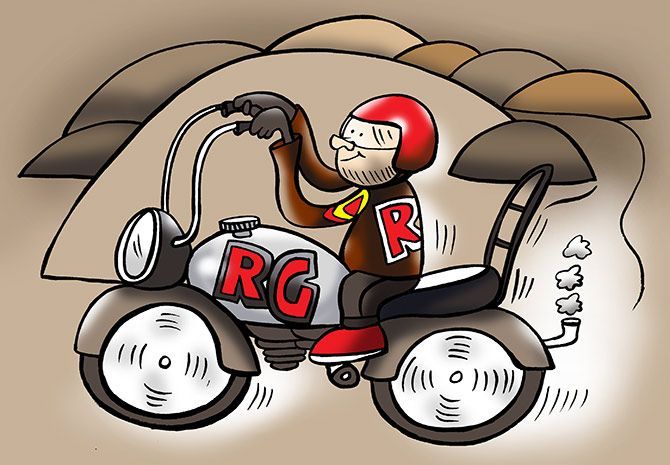'For the Congress, the family is the final court of appeal.'
'If there is no family, all leaders are equal.'
'If all leaders are equal, anyone can lead the Congress.'
'So every time the family has stayed in the background, the Congress has split,' points out Aditi Phadnis.

Illustration: Uttam Ghosh/Rediff.com
Rahul Gandhi is set to become Congress president, a post that was once occupied by his father, mother, grandmother, grandfather and great-grandfather.
All his relatives were strong-minded individuals who left their own mark on the Congress party and the direction it took.
Shehzad Poonawalla has raked up a controversy about family and dynasty that is unlikely to fly within the Congress. Here is why.
Rahul Gandhi has had phases of obsessions about the way the Congress should look.
First, it was all about internal democracy. More of it.
So the organisation was told that it must hold primaries where the people who get the most votes of party workers would be selected as party candidates. But that didn't really work.
Many of those who won the primaries were children of Congressmen. As second or third generation Congressmen they enjoyed loyalty and extended patronage so losing the primaries was like losing the family title.
And those who did win those elections lost the real election.
So the project to make the Congress look less like a Mother and Child party was put off. More like abandoned. The party hasn't really revisited that.
Witness the decision to name Tarun Gogoi the chief minister of Assam before the assembly elections: It was in protest against promotion of his family by Gogoi that a man like Himanta Biswa Sarma left the Congress and joined the Bharatiya Janata Party.
And thinking firmly in the box, last year the Maharashtra Congress, on its Facebook page, welcomed image manager Prashant Kishor's suggestion that Priyanka Gandhi Vadra play a greater role in Congress politics!
This is tacit acknowledgement that Rahul Gandhi's leadership may have been underwhelming but that the alternative must come from within the family.
The past tells us about the present.
Wake up a Congressman in the middle of the night and ask him why he tolerates a regency. His unguarded, spontaneous response will be: 'The family has made sacrifices for India that no one else has.'
The answer to this comes from Congress critics. The Bharatiya Janata Party says: 'Our party is also a family. We too have sacrificed: The founder of the Jana Sangh, Shyama Prasad Mukherjee, was assassinated; Deendayal Upadhyaya was killed. Do you hear of anyone from the family of these leaders making a claim to head the BJP just because they are related to them?'
But the fact is, for the Congress, the family is the final court of appeal, the first among unequals.
If there is no family, all leaders are equal. If all leaders are equal, anyone can lead the Congress.
So every time the family has stayed in the background, the Congress has split.
The breakaway group calling itself the 'real' Congress has split further: Whether it was the Congress-S formed in the aftermath of the Emergency that broke away to call itself the Samanantar Congress in Maharashtra under Sharad Pawar's leadership in the late 1970s; or the Rashtriya Samajwadi Congress launched in 1986 by Pranab Mukherjee after Indira Gandhi's assassination when he mistakenly thought the party had become a republican animal and would prefer him over Rajiv Gandhi as prime minister; or the Congress in Tamil Nadu, which split in 1996 when Sonia Gandhi was still in mourning (she formally joined the party only in 1997) and P V Narasimha Rao was running things along with Sitaram Kesri as party president.
True, there were other reasons for the split -- but ultimately an Indira Gandhi loyalist like G K Moopanar broke away from the Congress because the family was not a compulsion.
A rebellion against Narasimha Rao in 1994 was led by N D Tewari and Arjun Singh and called itself the All India Indira Congress. But the 'convention' held by the party kept waiting and waiting for 10 Janpath to endorse it -- and when the message from 10 Janpath came it was that Soniaji would never bless a faction of the Congress: So that was a non-starter.
This then leads us to the somewhat unsettling conclusion that one of the most important political forces in the world's most populous democracy will always be run by one family.
And only that family has the power to divest itself of that responsibility which it does not seem to be inclined to do at present.











